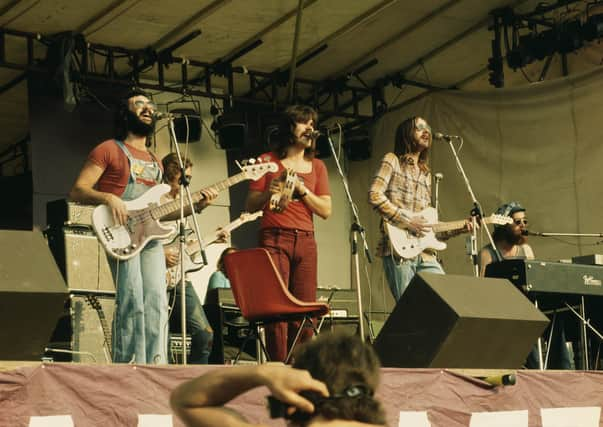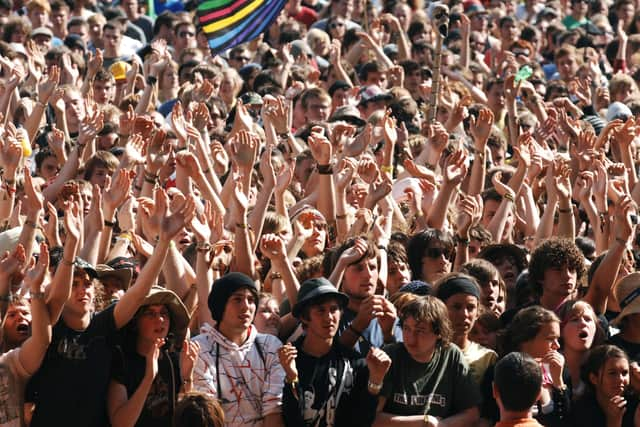50 years on: How Leeds and Reading Festivals began in church


It is a hedonistic summer ritual that began, of all places, in church.
Half a century ago this coming summer, the crowds began turning up on the banks of the Thames to worship at the altar of the high priests of rock and roll. The first Reading Festival was a watershed in British music history, the moment at which vast outdoor gatherings became part of the commercial mainstream. And although it would be another 28 years before the party moved north to Leeds, the rite of passage had been established for a generation.
Advertisement
Hide AdAdvertisement
Hide AdIt cost just £2 to see Lindisfarne, Rory Gallagher and Ralph McTell headline three days of performances at what the poster called a “beautiful Thames-side camp site and arena” half a mile from the town centre. Reading Council had allowed it to go ahead as an experimental addition to its decade-old jazz and blues festival. They could not have known what they were unleashing.


There had been outdoor music gatherings in Britain before – on the Isle of Wight from 1968 and at Glastonbury from 1970. But they had grown out of the “free festival” movement spawned by the hippie counterculture of the late 1960s. Reading was never anything other than materialistic.
Yet, as one Yorkshire academic pointed out, it had its roots in a much earlier form of musical celebration.
“Actually, it can be traced back to the Christian church hundreds of years ago,” said Rupert Till, a professor of music at Huddersfield University.
Advertisement
Hide AdAdvertisement
Hide Ad“They didn’t originally have pews, and that meant people were able to start dancing in church, which was considered unseemly. So they created festive days, including the Christian festivals we have now, which people could enjoy outside in the churchyard.
“They would celebrate the good weather or some other joyous occasion with some kind of feasting which always included music and dance.
“It still happens in some countries. If you go to a village in Italy or in Spain on one of these days, everything will come to a standstill and the whole village will be out, celebrating the festival.”
In Britain, the tradition developed in a more idiosyncratic way, Professor Till said, with gumboots and sun cream in equal measure in deference to the changeable climate.
Advertisement
Hide AdAdvertisement
Hide Ad“There’s a great British tradition of camping. And if you combine camping with young people, music culture and the Woodstock festival movement, you get what we now consider the great British music festival. There’s a remarkable number of them in the UK now. It’s become an enormous thing, especially considering the unpredictable weather.
“And wellies and waterproofs are an exclusively British phenomenon. We’ve adopted a bunker mentality of sticking together when it rains.”
The Reading Festival is expected to return for the August bank holiday this coming summer, with the Northern leg at Bramham Park in Leeds, where it moved in 2003 after four years at Temple Newsam.
For those who attend it will be, said Professor Till, “a glorified sleepover”.
Advertisement
Hide AdAdvertisement
Hide Ad“They have become a rite of passage – especially for 16 to 21 year-olds, for whom going off to festivals in the summer is perhaps their first chance to experience being away from home and having a bit of independence and freedom.
“It’s also often the first chance that young people have to behave together in the way they want, away from their parents.”
It is a far cry from those early days of 40 years ago, when festival-going was still a somewhat furtive exercise.
“It used to be almost a secretive thing. Young people would go off to these festivals and be slightly debauched and misbehaved. People would be drinking or consuming various illegal substances – they would enjoy these lost weekends away from normal life.
Advertisement
Hide AdAdvertisement
Hide Ad“But now that TV coverage has shown festivals to a mass audience, it’s no longer just hardcore music fans who go.”
A weekend ticket for the next Leeds Festival will cost £232 – well over 100 times the 1971 price. Even so, it is cheaper than seeing bands individually, Professor Till points out.
“Bands tend to charge the promoters less for a festival performance, because they can turn up in a bus with just a small crew, without their own equipment, and get massive exposure. For a lot of bands festivals are the biggest audiences they will play to.”
For the crowds – 105,000 at Reading and 75,000 at Leeds – it is a modern-day pilgrimage.
Advertisement
Hide AdAdvertisement
Hide Ad“It’s actually quite tribal. It helps to bond communities together, which is important,” Professor Till said.
• The first post-war British music festivals were built around jazz and folk, not rock. The Reading event has its roots in the National Jazz Festival, held in 1961 at Richmond Athletic Ground in Surrey, with jazz musicians Chris Barber, Ken Colyer and Johnny Dankworth headlining. Its inspiration was the Newport Jazz Festival in the American state of Rhode Island, which had been established in 1954.
For years it was a small-scale affair, and following complaints about inadequate facilities, it moved to the Royal Windsor Racecourse, and later to Kempton Park Racecourse, where the first scenes of crowd unrest were reported. Fans annoyed at a delay in Jerry Lee Lewis’s appearance began throwing coins at other performers.
Relocated to Reading, the 1973 festival was notable for George Harrison, who lived nearby, working unnoticed as a volunteer stagehand.
Advertisement
Hide AdAdvertisement
Hide AdSupport The Yorkshire Post and become a subscriber today. Your subscription will help us to continue to bring quality news to the people of Yorkshire. In return, you’ll see fewer ads on site, get free access to our app and receive exclusive members-only offers. Click here to subscribe.
Comment Guidelines
National World encourages reader discussion on our stories. User feedback, insights and back-and-forth exchanges add a rich layer of context to reporting. Please review our Community Guidelines before commenting.